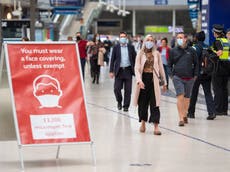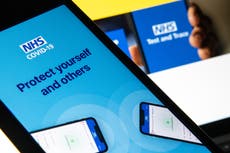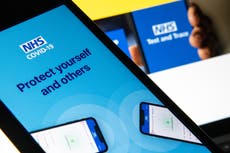Coronavirus: NHS app users who receive a ‘false positive’ message still at higher risk of getting the disease, experts warn
Reports suggest the technology could struggle at times to tell how far apart two users are
Your support helps us to tell the story
From reproductive rights to climate change to Big Tech, The Independent is on the ground when the story is developing. Whether it's investigating the financials of Elon Musk's pro-Trump PAC or producing our latest documentary, 'The A Word', which shines a light on the American women fighting for reproductive rights, we know how important it is to parse out the facts from the messaging.
At such a critical moment in US history, we need reporters on the ground. Your donation allows us to keep sending journalists to speak to both sides of the story.
The Independent is trusted by Americans across the entire political spectrum. And unlike many other quality news outlets, we choose not to lock Americans out of our reporting and analysis with paywalls. We believe quality journalism should be available to everyone, paid for by those who can afford it.
Your support makes all the difference.Users of the new long-awaited NHS coronavirus app who receive a “false positive” message will still be at a higher risk of contracting the disease, experts have warned.
Scientists who worked on the new system also played down reports that one in three warnings that a close contact has tested positive for Covid-19 would be wrong.
“Great progress” had been made on the bluetooth technology, which records how far away users are from other smartphone owners with the app, they said.
David Bonsall, from Oxford University’s Nuffield Department of Medicine, who is also an adviser to the Department of Health and Social Care, said the term “false positive”, while strictly true in scientific terms, was a slight misnomer.
App users would be notified only if they had been in contact with someone who later tested positive for coronavirus, he said.
Dr Bonsall said that while the “false positive” was “the right term for scientists to be using, I think is an unhelpful term… they are all (users) who have been close to people with Covid-19. So their average risk is still higher than the average population.”
Reports have suggested the technology could struggle at times to tell how far apart two users are.
Ministers are expected to announce next week how many people have downloaded the app.
International comparisons suggest the take-up rate will be less than a third of the adult population of England and Wales, at between 10 and 30 per cent.
But NHS insiders believe if just 15 per cent of people use the app, it can have a meaningful effect on the R number, the rate at which the virus spreads.
Health secretary Matt Hancock has said people could be asked to self-isolate multiple times by the new tracing app.
He denied it was confusing that requests to self-isolate by the app were not a legal duty, while the same request from NHS Test and Trace was.
He told Times Radio: "If the app tells you to self-isolate, then you should self-isolate. But if an NHS Test and Trace contact tracer tells you, then you must by law."
Asked whether that was complicated to understand, he said: "Not really, it is really straightforward."
At the weekend, ministers announced that anyone who failed to self-isolate after being told to by NHS Test and Trace could face fines of up to £10,000.



Join our commenting forum
Join thought-provoking conversations, follow other Independent readers and see their replies
0Comments